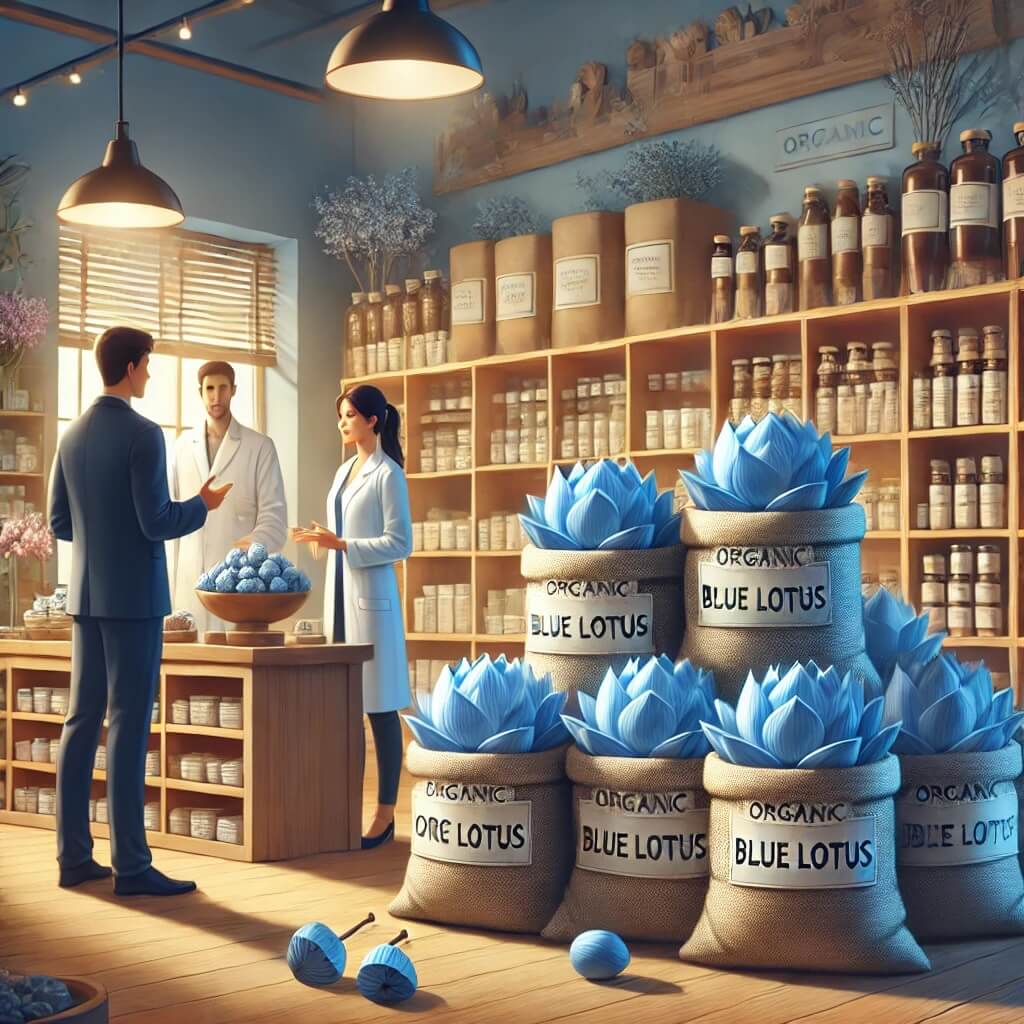The herbal medicine market in the US continues to expand as consumers seek natural solutions for wellness, and one herb that stands out is Blue Lotus. With its deep history in spiritual and medicinal traditions, Blue Lotus offers significant opportunities for bulk sellers to tap into the growing demand from US herbalists. This article explores key strategies to effectively sell Blue Lotus in bulk to herbalists, ensuring success in this niche but expanding market.
The Growing Popularity of Blue Lotus in Herbal Medicine
As natural remedies become more popular in the US, Blue Lotus is gaining attention for its potential benefits in promoting relaxation, reducing stress, and supporting better sleep. Many consumers are turning to Blue Lotus as a natural alternative to pharmaceuticals, and herbalists are increasingly interested in offering high-quality Blue Lotus products to meet this rising demand. This creates a perfect opportunity for bulk sellers to supply herbalists with a steady stream of this versatile herb.
Key Strategies for Selling Bulk Blue Lotus to US Herbalists
1. Emphasize the Unique Benefits of Blue Lotus
To attract herbalists, it’s important to clearly communicate the health benefits of Blue Lotus. Historically used for its calming properties, Blue Lotus is often seen as a gentle sedative that can help with stress relief and anxiety. It also has potential uses in promoting restful sleep, making it ideal for herbalists who focus on holistic health and natural wellness.
Ensure that your marketing materials and product descriptions clearly highlight these benefits. Including scientific studies or references to traditional uses can further validate its efficacy and encourage herbalists to incorporate it into their practices.
2. Prioritize Quality and Ethical Sourcing
Herbalists are discerning customers who place great emphasis on quality and purity. To successfully sell bulk Blue Lotus, ensure that your product meets the high standards required in the herbal medicine community. This includes offering:
• Organic and chemical-free Blue Lotus, ensuring that it is safe for consumption and free from harmful pesticides or additives.
• Ethically sourced Blue Lotus, particularly from regions known for high-quality cultivation, such as Egypt or Thailand. Transparency in sourcing builds trust with herbalists who care about the origins of their herbs.
Providing detailed information on your quality control measures—such as lab testing for purity and potency—can reassure herbalists that your Blue Lotus is a premium product they can confidently recommend to their clients.
3. Offer Flexible Bulk Pricing and Incentives
Bulk purchasing is attractive to herbalists for its cost-saving benefits. To capitalize on this, offer competitive pricing that reflects the value of your Blue Lotus while making bulk orders more economical than smaller quantities. Consider adding additional incentives, such as:
• Discounts for first-time bulk orders.
• Free shipping on large purchases.
• Loyalty programs for recurring customers, which can build long-term relationships with herbalists who need consistent supplies.
Providing these types of incentives can help distinguish your offering from competitors and make your Blue Lotus a go-to choice for herbalists.
4. Educate and Build Relationships with Herbalists
Building trust with herbalists goes beyond just offering a good product. Providing educational resources about the benefits and proper uses of Blue Lotus is essential. Create materials that explain its history, its traditional uses in herbal medicine, and current research on its efficacy. This helps herbalists feel more confident in recommending Blue Lotus to their clients.
Additionally, building strong relationships with herbalists is key to long-term success. Engage with herbalist communities online, attend herbal medicine conferences, and offer samples or educational sessions to demonstrate the value of Blue Lotus in their practice. Regular communication and follow-up ensure that you remain top of mind when they need to restock.
Elevating Your Blue Lotus Sales Strategy
Selling bulk Blue Lotus to US herbalists requires a well-rounded approach that prioritizes quality, education, and relationship-building. By positioning Blue Lotus as a high-quality, versatile herb with valuable health benefits, and by providing competitive pricing and incentives, you can tap into the growing demand in the herbal medicine market.
The combination of emphasizing authentic sourcing, ensuring consistent quality, and offering flexible pricing strategies will make your Blue Lotus offering stand out in a competitive market. Herbalists are seeking reliable suppliers, and by providing the best Blue Lotus at competitive rates, you position yourself as their preferred source.
Conclusion
As more consumers turn to natural remedies, the demand for Blue Lotus in the herbal medicine market continues to grow. With the right strategy, selling bulk Blue Lotus to US herbalists can become a lucrative and fulfilling business opportunity. By focusing on quality, building strong relationships, and educating your customers, you can meet the needs of herbalists and help them provide their clients with one of nature’s most revered herbs.

